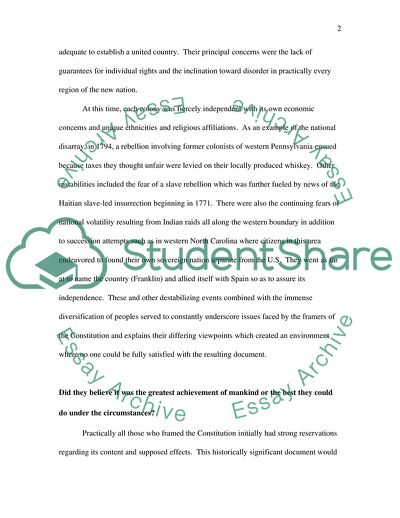
- Home
- Free Samples
- Premium Essays
- Editing Services
- Extra Tools
- Essay Writing Help
- About Us
- Studentshare
- Subjects
- Miscellaneous
- Constitutional research online
Constitutional research online - Essay Example

- Subject: Miscellaneous
- Type: Essay
- Level: Masters
- Pages: 4 (1000 words)
- Downloads: 0
- Author: jimmymann
Extract of sample "Constitutional research online"
This process would be difficult under the best of circumstances but at this point in American history, the new nation was a culturally diverse populace which was largely sparse, spread out over a vast expanse of land and lacked effective means of communication. Most were skeptical that a piece of paper which attempted to bind the fragile collection of former colonies would alone be adequate to establish a united country. Their principal concerns were the lack of guarantees for individual rights and the inclination toward disorder in practically every region of the new nation.
At this time, each colony was fiercely independent with its own economic concerns and unique ethnicities and religious affiliations. As an example of the national disarray, in 1794, a rebellion involving former colonists of western Pennsylvania ensued because taxes they thought unfair were levied on their locally produced whiskey. Other instabilities included the fear of a slave rebellion which was further fueled by news of the Haitian slave-led insurrection beginning in 1771. There were also the continuing fears of national volatility resulting from Indian raids all along the western boundary in addition to succession attempts such as in western North Carolina where citizens in this area endeavored to found their own sovereign nation separate from the U.S. They went as far at to name the country (Franklin) and allied itself with Spain so as to assure its independence.
These and other destabilizing events combined with the immense diversification of peoples served to constantly underscore issues faced by the framers of the Constitution and explains their differing viewpoints which created an environment where no one could be fully satisfied with the resulting document. Practically all those who framed the Constitution initially had strong
...Download file to see next pages Read MoreCHECK THESE SAMPLES OF Constitutional research online
Post Confederation Canada
Public Law - Parliamentary Sovereignty of the UK
Politics of Japans Constitutional Reform
American Constitution
The Constitutional Reform Act of 2005
Doctrine of Sovereignty and Jackson
The Legal Foundations of EC Law
The Decision in Pratt And Morgan Focusing on Its Key Legal and Organisational Implications

- TERMS & CONDITIONS
- PRIVACY POLICY
- COOKIES POLICY